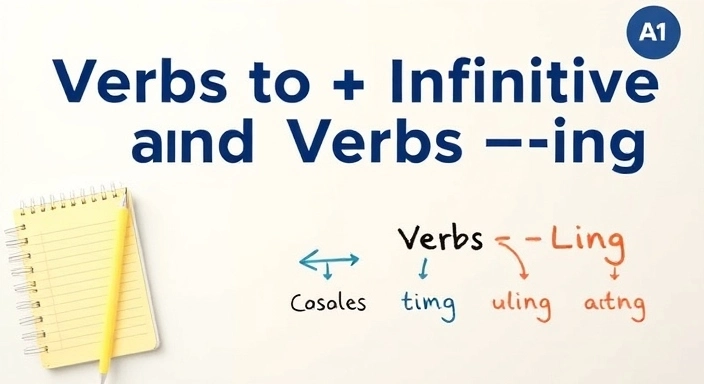Verbs + to + infinitive and verbs + -ing
- Home ›
- Grammar ›
- A1 Elementary ›
- Verbs + to + infinitive a...




Choose the correct infinitive or -ing forms.
Choose the correct infinitive or -ing forms.
Choose the correct infinitive or -ing forms.

- 26 November, 2024
- 407
- Grammar
- A1 Elementary
Verbs + to + infinitive and verbs + -ing
Understanding Verbs + to + Infinitive and Verbs + -ing
In English, some verbs are followed by the infinitive form of the verb (e.g., to play), while others are followed by the -ing form (e.g., playing). Understanding when to use each form is important for constructing correct sentences. Let's explore the rules and examples for both.
1. Verbs + to + Infinitive
Some verbs are followed by to + the base form of the verb (infinitive). This structure is often used to express purpose, intention, or a future action.
Examples:
- I want to eat pizza. (desire)
- He decided to go home early. (decision)
- She promised to help me with my homework. (promise)
Common Verbs Followed by to + Infinitive:
- want, need, decide, plan, learn, agree, offer, hope, promise, forget
2. Verbs + -ing
Some verbs are followed by the verb + -ing form. This structure is often used to talk about actions that are ongoing, general likes or dislikes, or habits.
Examples:
- I enjoy playing football. (general preference)
- She avoids eating junk food. (habit)
- They admitted stealing the money. (confession)
Common Verbs Followed by -ing:
- enjoy, avoid, admit, dislike, finish, suggest, mind, practice
3. Verbs That Can Be Followed by Both to + Infinitive and -ing
Some verbs can be followed by both forms, but the meaning may change depending on which one is used.
Examples:
- I stopped to smoke. (I stopped what I was doing to have a cigarette.)
- I stopped smoking. (I quit the habit of smoking.)
- He remembered to call his mom. (He did not forget to call her.)
- He remembered calling his mom. (He has a memory of calling her.)
4. Key Differences
Use the following rules to decide whether to use to + infinitive or -ing:
| To + Infinitive | -ing |
|---|---|
| Focuses on the future or purpose. | Focuses on actions as concepts or habits. |
| Used with certain verbs like want, need, plan. | Used with certain verbs like enjoy, avoid, admit. |
| Examples: I hope to visit Paris. | Examples: I enjoy visiting Paris. |
5. Practice Questions
Try completing these sentences to check your understanding:
- She wants (go) to the park. Answer: to go
- They enjoy (swim) in the lake. Answer: swimming
- He promised (help) with the project. Answer: to help
6. Summary
Knowing whether to use to + infinitive or -ing depends on the verb and the meaning you want to convey. Practice and exposure to examples will help you master this grammar point.
Unfortunately, we currently do not have teaching materials available on this topic. We are working with all our efforts to prepare it. You can subscribe to Verbooze to be notified once the teaching materials are ready.




English Learning Made Easy & Accessible for Everyone
Boost your English skills with interactive lessons, grammar explanations, reading and listening exercises, and real-time feedback. Join our growing community and start improving today — all completely free!

